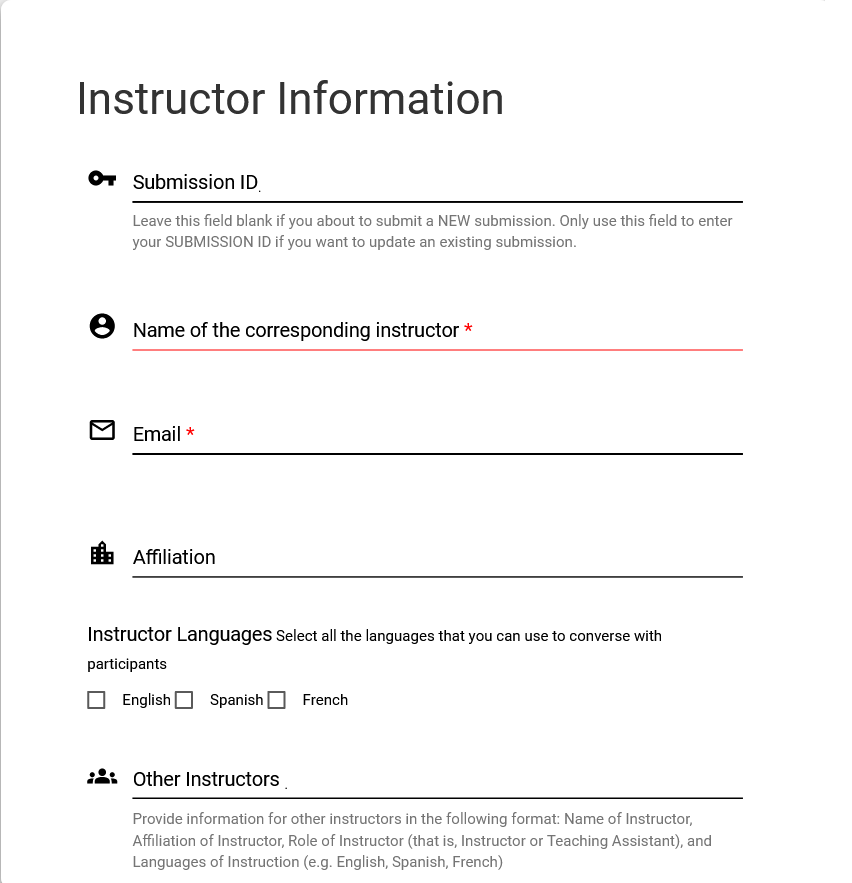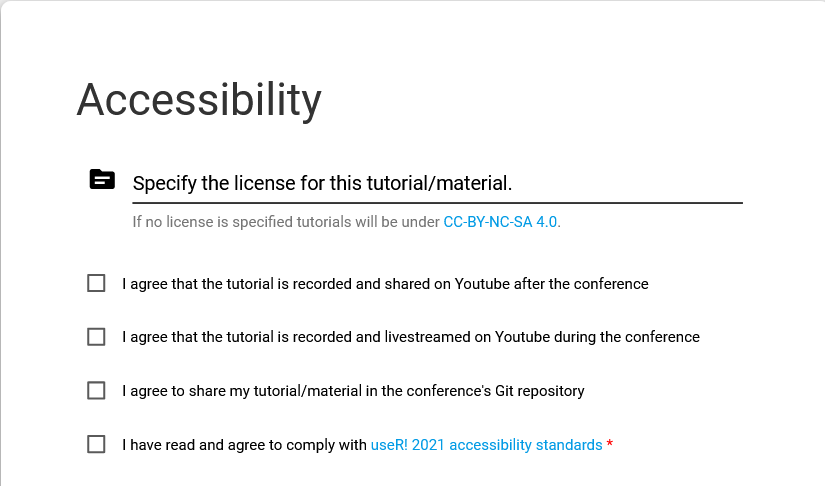Call for Tutorials - The form
By Yanina Bellini Saibene in Theme Features R
November 27, 2022
The purpose of this blog post is to help the organizers to create a a useful application form for the call for tutorials. The submissions form can be simple or includes several fields, which vary in their complexity.
I have already suggested that the call for tutorials be separated from the general conference call because the type of information required is different. For tutorials, it is essential to request information that contemplates the pedagogical aspects of the proposal.
When deciding what type of data to request, remember that this information will feed the rubric for evaluating the proposals. Therefore, it is essential that no information is missing and that we do not request data we will not use.
This article will give you a detailed insight into each field and explain the meaning of its content.
Information about the tutors
We always request the information about the people will be teaching. We are interested in their experience in the subject and teaching. This means general info like:
-
Name of instructor.
-
Email: for contact porpuse
-
Affiliation
-
Instructor Languages: in case you allow teach in different languages, you should list all the official languages and request teachers to select all the languages that they can use to converse with participants.
-
Role: ask for the role of each person, like: Instructor or Teaching Assistant.
-
A brief biography of the instructors: request they include experience teaching, experience on the topic, and detail any formation on teaching, like degrees or certification like The Carpentries Instructor training. Allow for 2500+ characters.

Tutorial Information
-
Tutorial title: the name of the tutorial.
-
Abstract or Description: a paragraph with topics to be covered. Mention a brief detail of resources to deliver the tutorial online/in person using active teaching (e.g., break out rooms, pair programming, shared repo, sticky notes). Allow for 1000 to 2500 characters.
-
Motivation: Why is the tutorial suitable for your conference participants? You can ask for the learner personas here. - Allow for 1000 to 2500 characters
-
A brief time outline: tutorial outline with the approximate duration of each section, for example, lecture 20 minutes, live coding 15 minutes, lab 20 minutes, 10 minutes break every 50 minutes. - Allow for 2500+ characters.
-
Learning Goals and Objectives: Provide a paragraph or list of learning goals and objectives - 2500 characters
-
Topics: The broad topic the tutorial covers. - Allow for 1000 to 2500 characters.
-
Keywords: between 3 to 5 keywords, trying not to repeat the title word.
-
Length of the tutorial: the duration. Indicate the time unit (minutes or hours).
-
The intended audience: you can ask for the target audience (like journalists or bioinformaticians), the level of knowledge of the intended audience (beginners, intermediate, advanced), and other Required Background Knowledge. If you don’t request learner personas in the motivation point, you can request them here.
-
Pedagogical tools: you can request more detailed information about teaching tools the tutors will use during the tutorial.
Logistics details
-
Time zone: You can accommodate the schedule to different time zones for online conferences. Asking tutors for their preferred time slot (more than one) will help with the program of the tutorials.
-
Maximum Attendees: the maximum number of attendees.
-
Language: language in which the tutorial can be taught.
-
Prerequisites/requirements: required equipment and required software for the attendees.
I suggest adding a free text field to allow tutors to add details. For example, you create an Anything else we should know? type of questions. This field was used for a team of tutors to let us know they have their teaching platform and for another team to explain they will gif books on the tutorial topic for the attendees.
Access
-
License: request tutors specify the license for their tutorial/material. Be clear about which license you will use if no license is selected. For example, for useR! 2021 we release all material under CC-BY-NC-SA 4.0.
-
Request links to the tutorial materials and web page (If one exists).
-
Ask for agreement on record or livestream the tutorial.
-
Ask for agreement on the moment - during or after the conference - for sharing the tutorial.
-
Ask for agreement on the modality of sharing the recording, for example, on the YouTube/Vimeo channel of the conference or the event platform.
-
Ask for an agreement about how much time the tutorial will be available, for example: forever, for 30 days after the conference, until the new conference.
-
Ask for an agreement on who can access the tutorial. For example, only the people that pay for the conference, anyone.
-
Ask for agreement on how to share the tutorial material, for example the conference Git repository.
-
Ask for " I have read and agree to comply with the conference’s accessibility standards"
-
Ask for " I have read and agree to comply with the conference’s Code of Conduct"

Next steps
In the next post, I will detail the rubric to review and evaluate the tutorials proposal with the information requested on this form. I will also give details on the process of review.